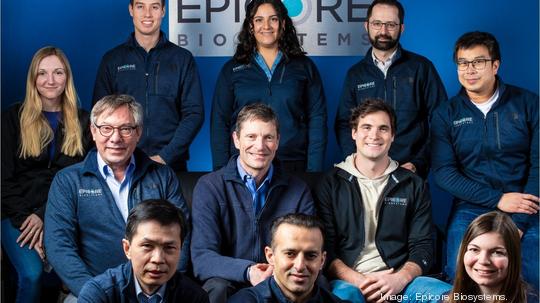
After securing partnerships with the likes of PepsiCo, Gatorade and the U.S. Army, a Cambridge-based startup has raised $10 million in its first substantial funding round.
Epicore Biosystems Inc. announced this week that it closed an oversubscribed Series A investment round with funding from Chevron Technology Ventures, Alumni Ventures and Joyance Partners.
The company makes wearable, “skin-like” patches that measure biomarkers found in sweat. The patches can track things like hydration, cortisol — your body's main stress hormone — and glucose levels.
“Largely speaking, up until now, how do you deal with sweat?” said Roozbeh Ghaffari, CEO and co-founder of Epicore Biosystems. “You basically wipe it all off and put it into the laundry basket. It turns out there’s a rich amount of information that’s just lost and we’re starting to tap into that.”
Ghaffari said data from the patches can be read through a smartphone camera or electronics built into the patches. Image processing algorithms paired with a phone’s camera can scan patches and determine color changes that indicate different concentrations of biomarkers, such as a higher concentration of cortisol. Or, electro-chemical sensors on the patch can measure biomarkers and send the data via Bluetooth to a phone. Epicore Biosystems is developing and using both in its products.
Epicore Biosystems was spun out of Northwestern University’s Querrey Simpson Institute for Bioelectronics and John Rogers Laboratory and launched in 2017. The company bootstrapped initially, only raising $350,000 in a seed round in 2018.
In March 2021, Epicore Biosystems launched its first commercial product with PepsiCo and Gatorade. The Gx Sweat Patch tracks hydration through the Gx app and is available on Gatorade’s website and at sporting stores.
Ghaffari said the company is also testing its products in different industries, including with the U.S. Air Force and Army.
“It turns out that dehydration and heat injury isn’t just a sports related area of active research,” Ghaffari said. “It’s also an issue that various military personnel face and there’s a slew of research and deployments that we as well as others have looked at in the context of battlefield hydration.”
Ghaffari said the company previously had enough business deals and non-dilutive funding to grow without raising substantial venture capital. Now, the company has big expansion plans that will be made possible through this new capital.
“It’s really based on a key goal around growing out not just our manufacturing scale-up, but also building out a whole cloud ecosystem around our platform, around the metabolic health data that’s starting to be built,” Ghaffari said.
The cloud platform will help bring in new data streams, such as a user’s activity level, to pair with the biomarker data, Ghaffari said. Users could analyze long-term data.
“The data streams that come out of this device introduce a whole new range of measurements that are not invasive but you can also relate them to your heart rate, your heart rate variability, your motion, your activity,” Ghaffari said. “All of those things are now new data streams that we’re starting to glean and make sense of today.”








